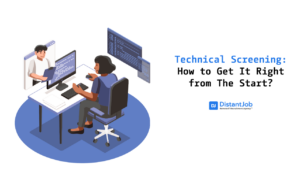If you’re expanding your business globally or thinking about improving your database system, sooner or later you may take into consideration hiring an Oracle Database developer.
Oracle database is one of the most trusted software to manage app databases and users’ interactions. In 1977, Lawrence Ellison developed this software as part of a relational database framework where users can directly access data objects. The system can manage the inputs from different databases as a unit, making Oracle one of the best software to manage different databases.
Looking at the enterprise database market, Oracle DB is the stronger rival of Microsoft’s SQL server. With a similar structure, these systems are the most reliable choice when it comes to database administration. How to make sure to hire the best developer for your team?
OracleDB Developer vs DBA Developer
When it comes to hiring, we need to make a distinction. If you need someone to develop and program your database network, you are looking for an OracleDB developer.
Database developers take over from analysts and designers. Examining the high level of documentation produced in the initial stage, they create the database application building all the components — tables, queries, reports, etc.
If you need someone to help users with daily issues once the database is running, you need an Oracle DBA developer. Database administrators take care of security monitoring who is accessing the data. Additionally, DBA developers are responsible for running the whole process, collaborating across different departments.
Things to Focus on When Hiring Oracle DB Talent
When looking to hire an Oracle DB developer, it’s essential to consider both their technical skills and their ability to adapt to your company needs. Here’s what you should focus on:
- Technical Proficiency: Ensure the candidate has a strong foundation in Oracle Database management, including experience with SQL and PL/SQL programming, database architecture, performance tuning, backup and recovery procedures, and security practices.
- Experience: Look for candidates with hands-on experience relevant to your specific use case. This could include work with Oracle Database versions that your organization uses, as well as experience in industries similar to yours.
- Problem-Solving Skills: Given the critical nature of database management, assess the candidate’s ability to troubleshoot and solve complex problems efficiently.
- Interview Questions: Prepare a list of interview questions that cover:
- Fundamental concepts of database management and Oracle-specific features.
- Real-world scenarios that require the candidate to demonstrate their problem-solving approach and technical know-how.
- Questions that gauge their experience with database optimization and performance improvements.
- Certifications: While not always necessary, certifications like Oracle Certified Professional (OCP) can indicate a candidate’s dedication to their profession and expertise in Oracle technologies.
- Cultural Fit: Ensure the candidate aligns with your company’s culture, especially if they will be collaborating with teams across different departments. Their ability to communicate effectively and work as part of a team is crucial.
- Continuous Learning: Given the rapid evolution of technology, look for candidates who show a commitment to continuous learning and staying updated with the latest Oracle database features and best practices.
Now if you need a developer or an administrator, it’s important to ask the right things in the interview process. Here are the best Oracle interview questions for both roles:
Interview Question for an Oracle DB Developer
1. Explain SAVEPOINT and give an example
In Oracle, you can name and mark your current spot in the transaction’s processing with the SAVEPOINT statement. All savepoints will be erased with a simple rollback or commit. Additionally, “when you roll back to a savepoint, any savepoints marked after that savepoint are erased,” although the one that you roll back does remain.
Your OracleDB developer for hire should also know that they can use savepoints to undo parts of a transaction rather than the whole thing with the ROLLBACK TO statement. Savepoint names can be reused; this simply makes the savepoint move from its old position to the point in which it’s renamed.
OracleDB marks savepoints implicitly before executing an INSERT, UPDATE, or DELETE statement. Then, if the statement happens to fail, the database automatically performs a rollback to this implicit savepoint.
2. Briefly, explain the OracleDB ANALYZE statement
The analysis statement is a particularly useful one for any OracleDB developer to know. It collects or deletes statistics about a particular index or index partition, table or table partition, index-organized table, cluster, or scalar object attribute.
With this statement, you can also identify migrated and chained rows of a table or cluster as well as validate the structure of an index or index partition, table or table partition, index-organized table, cluster, or object reference (REF).
3. Explain a hash cluster in Oracle and give an example
The reason that your OracleDB developer should know about sorting tables in a hash cluster is because it’s used as an alternative to a non-clustered table with an index or an index cluster to improve the performance of data retrieval.
It works by physically storing the rows of a table in a hash cluster. Then, when you need to retrieve the data, it performs this action according to the results of a hash function. Hash values, which are numeric values, generated by OracleDB’s hash function, and based on specific cluster key values.
A minimum of two I/Os is necessary to find or store a row in an indexed table or cluster, although there are typically more than two. However, no I/O is required to locate a row in a hash cluster because the database utilizes a hash function; although, to read or write a row in a hash cluster, a minimum of one I/O operation is necessary.
According to Oracle, the most useful times to use a hash cluster are under the following conditions:
- If the majority of queries on the cluster key are equality queries:
SELECT … WHERE cluster_key = …;- You have static-sized tables in the hash cluster and can determine exactly how much space is required for the tables. One of the downfalls of tables in a hash cluster is that the performance can suffer if they require more space than what was initially allocated for the cluster.
Ask your OracleDB developer for hire to perform an example of creating a hash cluster. In the following example by Oracle, trial_cluster is the name of the created cluster that holds the trial table. The trial no column is the cluster key, and the lower statement creates the table in the cluster.
CREATE CLUSTER trial_cluster (trialno NUMBER(5,0))
TABLESPACE users
STORAGE (INITIAL 250K NEXT 50K
MINEXTENTS 1 MAXEXTENTS 3
PCTINCREASE 0)
HASH IS trialno HASHKEYS 150;
CREATE TABLE trial (
trialno NUMBER(5,0) PRIMARY KEY,
…)
CLUSTER trial_cluster (trialno);4. What is the difference between a hot backup and a cold backup with Oracle?
Of course, we all know that backups are vitally important for your information. Because of this, your OracleDB developer should know them very well. A cold backup is performed when the database is in a shutdown state, and there is no user activity currently on the system. This type of backup creates a full copy of the database, allowing you to fully restore it if necessary.
A hot backup, on the other hand, is taken while the database is active. This type of saving provides you with an online backup with all files of the database copied. It doesn’t take care of active transactions, but there can be changes to the database during the copy.
Interview Questions for an OracleDBA Developer
1. To create a responsible file to speed up the installation of a database, how would you prepare the file?
A response file is a plain text file storing the options to create a database. You can create this file from scratch but it would take longer. It’s easier to customize manually installation media that come with a tempòate response file, which also contains notes about the parameters.
The most reliable way to create a response file, however, is Oracle Universal Installer. When you start the installer in ‘record’ mood every option at each step is saved in a response file in the correct format. Once the installer completes the record mode, you will have a response file with all the options set.
2. If a client forgets the password for the ‘SYSTEM’ user of his database and he cannot longer connect. How would you recover this admin password?
If other users have ‘DBA’ privileges, you can connect with them and change the password for the ‘SYSTEM’ user. Users with DBA privileges can change any user’s password, which is the easiest way but it may be not possible in any cases.
Without DBA users, the only way to access the database is using operating system privileges. At the operating system, the Oracle software runs under a specific user, usually named “oracle”. Also, you need a user group that the “oracle” user belongs to, usually called “dba”. The group can connect to the database with “SYSDBA” privileges in the operating system they belong to. So, you can ask the login to the system administrator for a server as an “oracle” user or any user who belongs to this “dba” group. Once in the operating system, you can connect to the database locally with SYSDBA privileges. After connecting to the database, you can change and reset the password for this system user.
3. What do you do to find out how many users are defined in the password file and their privileges?
To look in the password file, you need to query the ‘v$pwfile_users’ view to have information about existing users in the password file.
Here is how you execute the SQL query (Source: MindMajix.com):
Sql>SELECT * FROM v$pwfile_users;
The query above will return four columns for each user in the password file. The column names are USERNAME, SYSDBA, SYSOPER, and SYSASM.
- The USERNAME column shows the username of the user in the password file.
- The SYSDBA column shows whether the user has SYSDBA privileges or not.
- The SYSOPER column shows whether the user has SYSOPER privileges or not.
- The SYSASM column shows whether the user has SYSASM privileges or not.
4. What would be your main responsibilities of an Oracle DBA in an organization?
The main duty will be the organization of Oracle databases, which can involve writing code of a database from scratch. On a running system, the DBA developer is the only person able to shut down or start up the database. The DBA also creates new users and manages their privileges.
A DBA takes regular backup to ensure data safety and will restore the database from backups, monitoring the space usage and capacity planning for the database. Also, a DBA developer creates security policies and monitors database activities.
8 Steps to Hire an OracleDb Developer
Here are specific steps and insider tips to guide you through the process:
1.Define the Role and Requirements Clearly: Distinguish between the need for an Oracle Database Administrator (DBA) versus an Oracle Developer. DBAs focus on maintaining the database’s health, while developers concentrate on writing and optimizing SQL queries and PL/SQL programs.
2. Utilize Niche Job Boards and Forums: Post your job listings on specialized platforms and forums where Oracle professionals gather, such as Oracle Communities, Stack Overflow, and Reddit’s /r/Database or /r/Oracle. These can yield more targeted applicants than broader job boards.
3. Craft a Technical Screening Process: Develop a technical assessment that tests for in-depth knowledge of SQL, PL/SQL, Oracle’s architecture, performance tuning, backup, and recovery procedures. Consider using platforms like HackerRank or Codility for standardized tests.
4. Interview for Soft Skills and Cultural Fit: Assess communication skills, especially the ability to explain complex database issues to non-technical stakeholders. Look for a track record of continuous learning, a crucial trait in the ever-evolving tech landscape.
5. Leverage Your Network: Reach out to your professional network for referrals. Oracle professionals often know others in the field and can recommend candidates who may not be actively searching for new roles but are open to opportunities.
6. Consider Contract-to-Hire Options: For critical roles, a contract-to-hire arrangement can be beneficial. This allows both parties to evaluate fit and performance before committing to a permanent position.
7. Stay Informed About Market Rates: Understand the current market rates for OracleDB developers in your region and industry to offer competitive compensation packages. Use salary surveys from sites like Glassdoor, Payscale, and the Oracle Technology Network.
8. Highlight Professional Development Opportunities: OracleDB developers value opportunities for growth. Highlight any policies for professional development, such as budget for attending conferences, access to training materials, or certification reimbursement.
Now You Know
These are some of the best questions for these two roles. If you need someone to develop a backend application, an OracleDB is the role you should be looking for. If you need someone that administrate the database, a DBA will take care of your database maintenance and users.
So that’s it – our best tips to hire an OracleDB or an OracleDBA developer! But why go through all that trouble? We can do it for you – easily and painlessly.
We’ll take care of the evaluation and present you with three formidable candidates for your position, within two weeks – and you don’t pay until you hire! Sounds great? We’re here for you!




